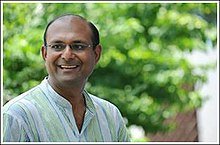Read in : தமிழ்
Balaji Sampath, an IIT graduate and a PhD from University of Maryland, has a passion for teaching Physics to young people. A co-founder of AhaGuru, Sampath talks about lessons learned from two years of NEET in Tamil Nadu.
Do you think Tamil Nadu students are getting the hang of NEET?
Cracking NEET is not a very difficult task. Students often think of NEET as something to prepare for after their boards. That is not going to work. It is a two-year effort at least.
Where do our State students do poorly?
Not just in our State, but everywhere too, Physics is the hardest. The students who have good memory power do well in Chemistry and Biology. If they are not able to do well in Chemistry and Biology, then they can’t do NEET.
The biggest flop area is Physics where scoring 150 is a big deal. Our students often end up scoring 20, 30 or 40.
Why?
Physics and Maths involve problem-solving. They can do well if they understand concepts and apply them to solve problems. NEET questions are easier than JEE. One of my students, Keerthana Kasi scored 676 and was placed all-India 12. If they can do well in Physics, that is a big push factor.
Can the typical state board student today aspire to clear NEET?
If they start in Class 11, they can. A score of 450+ is possible but they should not go by crash courses. One of the ways we can reach NEET training to students in smaller towns and villages is technology. A mobile phone app or even a tablet that multiple students can share is the way forward to train them towards cracking NEET. But just selecting a few bright students and coaching them for NEET is not the correct approach. The overall standards have to improve.
How do you rate present State board textbooks?
Everything I teach in JEE coaching in Maths and Physics is there in the State board textbooks now, plus some additional concepts. We are not lacking in curriculum.

Balaji Sampth
But our exams contain only what are called ‘book back’ questions – queries in the back of the book. In the past, even this was dispensed with and exams had questions from a few sample question papers that were called the blueprint, making it easier for students. This year there was no blueprint, only book back questions. Even CBSE has book back questions up to 50% but the numbers used in the problems are different though similar.
Won’t rural, poor students suffer if we make question papers more application-oriented and complicated?
From my experience, it is the poorer students who do better if we expose them to problem-solving and application-oriented education. They are more grounded, have less attention deficit issues and more capable of applying concepts. It is the rich who have institutionalized the mugging up method. Wherever the poor have got the opportunity, they have managed to do better.
What exam strategy do you advocate for NEET?
Don’t try to learn every topic; answer a few topics well and avoid negative marks. You can lose 200 marks and still do well. What you study, you study well.
Read in : தமிழ்











